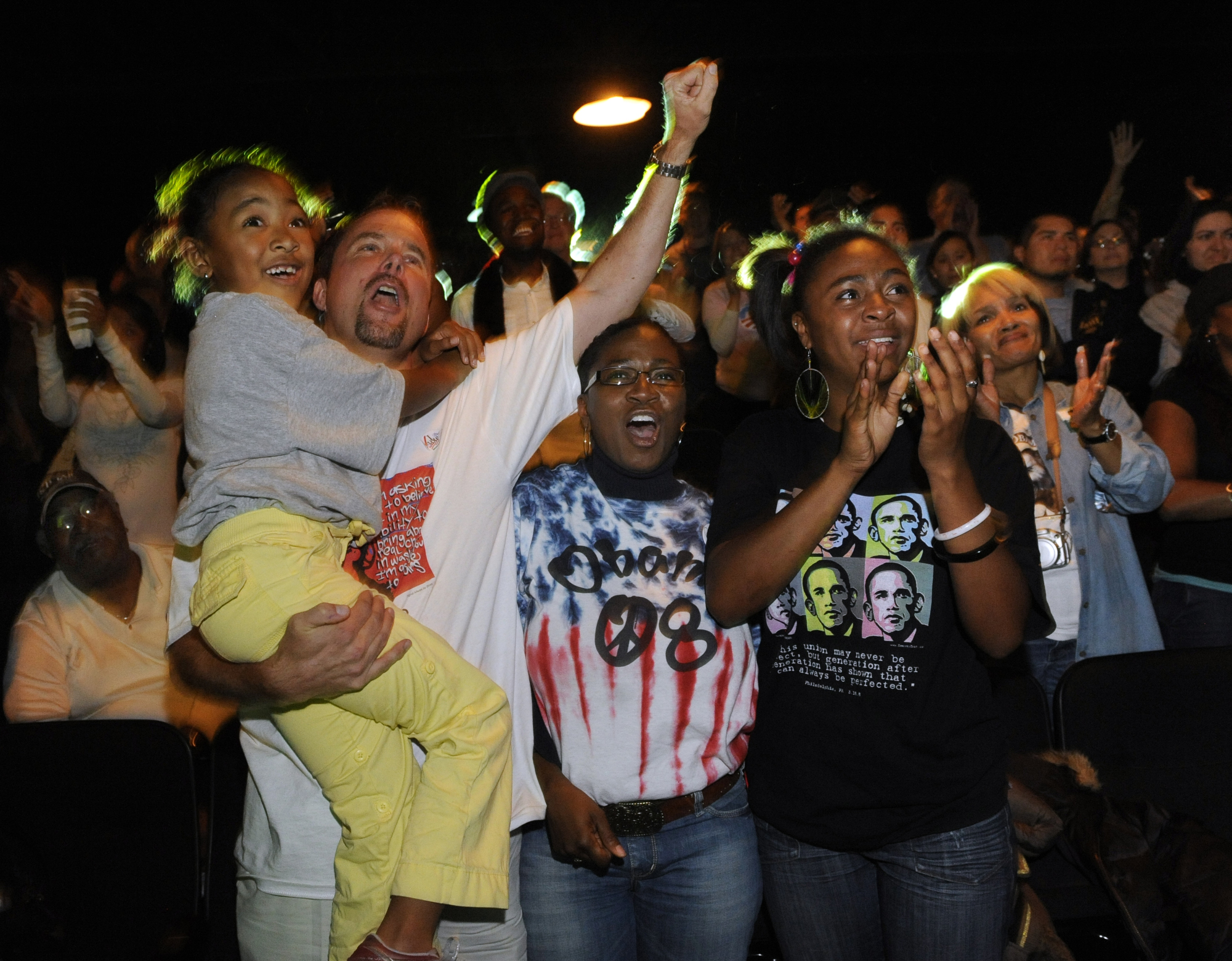‘America Saw Him’: Black Journalists on Obama’s Victory, Ten Years Later
When it comes to epochal events, whether it’s the assassination of Martin Luther King Jr. or the destruction of the Twin Towers, the go-to question to ask is always “Where were you?” But in a lot of ways, that’s pretty weak. The harder, more enlightening ask is “How did it feel?” That’s what I’m trying to put my finger on today as we all revel in the tenth anniversary of the election of the United States’ first black president, Barack Obama.
Like a lot of millenials, I was in a college bar when I found out he won. The news was broadcast on flatscreen TVs hovering above bottles of booze. As soon as it was a for sure thing, there were celebratory shots and shouts, and then we took to the streets to strut and sing. I called my mom and dad, a middle-aged black couple who never believed this country would ever elect someone who looked like them to lead the nation, and rejoiced with them over the phone as the rapturous sounds of my friends roared in the background.
But as ecstatic as I was, I can’t say that I felt surprised. Having been the rare black person in predominantly white spaces my entire life, the prospect of a black man in the White House never seemed impossible to me. The world I was born and raised in probably made it inevitable that I would take his election for granted.
But as sure as I was that he’d win, I wasn’t so sure he’d survive. Even on that jubilant election night, drunk on all the “hope-y, change-y stuff,” I understood enough about America to be fearful of what would follow. This country has a tradition of domestic political violence that extends from the rogue assassination of Abraham Lincoln to the state-sanctioned slaying of Fred Hampton. I wondered, if only briefly, how would those who were so invested in never seeing a black man be anything or have any power, let alone the presidency, react to Obama’s ascendance?
While Obama made it in and out of the White House intact, what celebratory naïveté I had has passed. From Charleston to Charlottesville, it’s clear the pendulum has swung back, cutting the nation and shedding American blood. Eight years after Obama’s historic election, Donald Trump seemed to me to have the same strange air of inevitability as his predecessor, riding on a wave of hate that felt just as propulsive as the hope Obama inspired. In both elections, I saw everything I’d come to understand about America. Obama signified how far we’d come. And Trump epitomized how far we need to go.
As we approach another precipice with these November 6 midterm elections, it’s anyone’s guess how the country will vote. But I still think that, despite the harsh realities we’ve faced in the wake of Obama’s election, the feelings we felt on that triumphant night can be instructive. They can tell us what to strive for and also what to be weary of going forward.
In honor of the tenth anniversary of Obama’s historic election, VICE has asked a number of notable black writers what they were feeling the night everything seemed to change, when a man who bled the same African blood as those who slaved to build the White House came to claim 1600 Pennsylvania Avenue as his home.

I was 13 years old pacing the living room of my New York apartment with my mom as the votes came in. We were both giddy and she kept making calls to friends and other family members as the night unfolded. It was almost humourous watching her at a new level of excitement, energy brimming over into spontaneous, silly dance moves and sporadic kickboxing imitations when a blue state landed a punch. But once the anchors finally said, “Barack Obama will be the 44th president of the United States,” I was suddenly the one on my knees crying when she looked back from her victory lap around the room. For being so young and new to understanding the depths of America’s wickedness, the weight of the moment wasn’t lost on me. I remember seeing Jesse Jackson crying when the Obamas came out on stage, beautiful as ever, and thinking about the people he could be wishing were there with him. I remember feeling happy for my mother thinking of the untold stories she may have of her blackness or single-motherhood holding her back from a dream. The moment felt untouchable, even if Obama decided not to go off on what the night meant for black people. It was all in the air. That night I got a glimpse of what it feels like to tap into a profound emotional connection to people you’ve never met and unnamed people who’ve built toward a moment together over centuries. It was a reminder that as much as I liked to clown around and run amok with my friends growing up, that there was another more serious side to me I could tap into when I was ready. That sense of deep investment in the stories that inform a moment, even if they’re not my stories, is largely what catapulted my interest in traveling to less developed countries and later in pursuing journalism in general. Once I started feeding my curiosity it was hard to ignore the pull toward unspoken history.
– Taylor Hosking
Sign up for our newsletter to get the best of VICE delivered to your inbox daily.
Follow Wilbert on Twitter.
This article originally appeared on VICE US.